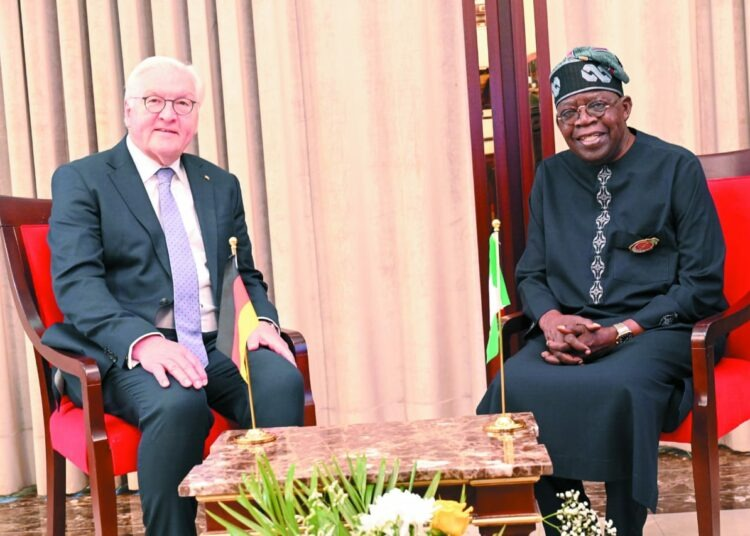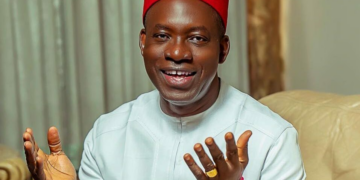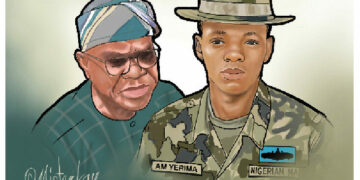President Bola Tinubu’s recent diplomatic dance with Germany is a potentially game-changing moment for Nigeria’s economic renaissance – if we don’t mess it up, that is.
On Wednesday, German President Frank-Walter Steinmeier arrived at the Forecourt of the State House, Abuja, at 11:06am for a state visit and was received by President Bola Ahmed Tinubu and members of the Executive Council.
On arrival, the German leader was welcomed with the German Anthem, Deutschland über alles, afterwards the guards of honour mounted by Brigade of Guards rendered the Nigerian National Anthem and led the visiting leader in inspection of the guard.
Steinmeier was also welcomed with a 21-gun salute by the Brigade of Guards.
For once, we’re not just talking; we’re strategising. The bilateral meeting with the German president wasn’t about exchanging pleasantries, but about serious business transformation.
Meanwhile, Tinubu didn’t just invite Germany; he laid out a comprehensive roadmap that suggests something might actually change this time.
Energy, solid minerals, renewable technologies – he’s not throwing darts in the dark, he’s targeting precise economic opportunities. It’s almost like someone in government has finally discovered a GPS beyond political patronage.
Let’s break this down. Germany isn’t just any country. They’re industrial powerhouses who know a thing or two about economic turnarounds. When Steinmeier talks about Nigeria needing “courage and perseverance”, he’s speaking from Germany’s own historical playbook of economic reconstruction. This isn’t some casual diplomatic small talk; this is a lesson in national transformation.
The most intriguing part? Tinubu seems to get it. He’s not just talking about opening doors; he’s dismantling administrative bottlenecks. The ministries of Solid Minerals, Power, and Trade have been directed to roll out the red carpet for investors. No more bureaucratic nightmares that have historically scared away potential partnerships.
Consider the numbers: A dedicated one billion Euro fund for renewable energy supply chain diversification. Critical minerals like lithium, cobalt, and nickel sitting right here in Nigeria. This isn’t charity; this is strategic economic positioning. For years, we’ve been sitting on mineral wealth while other countries extracted value. Now, it seems we might finally be waking up.
But here’s my challenge to the president: Words are cheap. Implementation is everything. We’ve heard countless promises of economic transformation. What makes this different?
The devil, as they say, is in the details. Tinubu talked about making investments “easy in and easy out”.
But how? What concrete mechanisms are being put in place? Our dynamic youth population is watching, and they need more than rhetoric.
Small and Medium Enterprises (SMEs) got a mention too. About time. These aren’t just businesses; they’re the backbone of any serious economic strategy. If Tinubu can genuinely reposition SMEs, he’ll have done more for economic democratisation than many of his predecessors.
Let’s not romanticise this completely. Nigeria’s economic challenges are deep-rooted. Decades of mismanagement, corruption, and short-sighted policies have left deep scars. One diplomatic meeting with Germany won’t magically heal these wounds. But it’s a promising start. A signal that maybe, just maybe, we’re moving from perpetual potential to actual performance.
The most refreshing aspect? A president who seems to understand that modern diplomacy is about mutual benefit, not patronage. When Tinubu says “we need each other”, it doesn’t sound like empty diplomatic speech. It sounds like a pragmatic understanding of global economic interdependence.
Take the renewable energy conversation. Nigeria has sunlight in abundance – a resource we’ve criminally underutilised. Germany has technological expertise. This isn’t just a partnership; it’s a potential blueprint for sustainable development.
Steinmeier’s commitment is telling. When he speaks about growing German interest in Nigeria beyond traditional giants like Siemens, it suggests a deeper, more nuanced engagement. We’re not just talking about traditional extractive relationships anymore.
The presence of key ministers – from Finance to Solid Minerals – tells another story. This isn’t a solo performance by Tinubu. It looks like a coordinated national strategy. Minister Dele Alake’s presentation about critical minerals wasn’t just a pitch; it was a detailed invitation to strategic collaboration.
To the skeptics who’ll say “we’ve heard this before” – fair point. Nigerian history is littered with promising starts that fizzled into nothing. But something feels different this time. Tinubu isn’t promising El Dorado. He’s talking about strategy, partnerships, and practical economic development.
Germany isn’t here out of charity. They see an opportunity. And for once, it seems Nigeria is smart enough to see the same opportunity.
The global economic landscape is shifting. Countries that understand strategic positioning will thrive. Those stuck in old, extractive models will be left behind. This German diplomatic engagement could be Nigeria’s sliding door moment – a chance to step into a different economic narrative.
Stay watchful. The proof will be in the execution. Not just in grand speeches, but in the nitty-gritty of policy implementation. Can we maintain this momentum? Can we translate diplomatic goodwill into tangible economic transformation?
Only time will tell. But for now, colour me cautiously optimistic.





